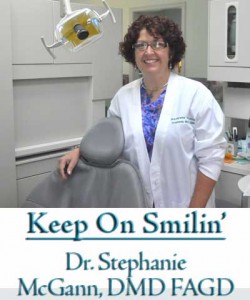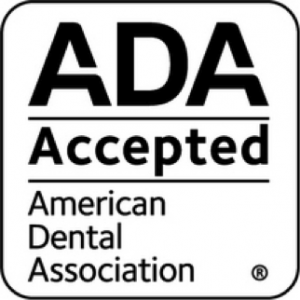American Dental Association’s seal means a product has been tested as effective
By Dr. Stephanie McGann, DMD, FAGD, Columnist, The Times
 Every day patients ask me what home care products they should use. While we always make recommendations based on individual needs and concerns, a good place to start is to look for the American Dental Association Seal of Acceptance.
Every day patients ask me what home care products they should use. While we always make recommendations based on individual needs and concerns, a good place to start is to look for the American Dental Association Seal of Acceptance.
Since 1930 The American Dental Association has been giving consumer oral health products a seal of acceptance or approval. Today there are more than 300 products by numerous manufacturers that carry this familiar seal. These products include toothpaste, mouthwash and other products we use every day. While the seal itself has gone through some face-lifts since 1930 the meaning of the ADA seal is unchanged.
The ADA Seal of Acceptance was developed by the American Dental Association to help consumers find out what products actually are effective at doing what they claim to do. The ADA Seal of Acceptance program was specifically developed to help consumers make informed purchasing decisions. In the early 1900’s there were lots of new products for sale and some of their claims were somewhat far-fetched or even dangerous. The ADA created the “seal” to allow consumers to see what products had been evaluated and tested by the dental community. Products that did not live up to their claims or were not really beneficial were not awarded the seal.
In the early part of the 20th century companies were selling things to soothe the gum of teething children that would land parents today in jail if they put it in children’s mouths!
Today: It is important to know that the ADA Seal of Acceptance is not a government program; it is run by the American Dental Association. Nearly 30 years ago President Ronald Reagan praised the American Dental Association for developing the program. He awarded the ADA a certificate of commendation in 1984 and remarked how not all industries are able to regulate themselves so carefully without the need for federal government oversight.
How does a product get approved? In order for a manufacturer to place the ADA Seal of Acceptance logo on its product, the product has to undergo lots of testing to make sure that it actually does what it says it will do. The testing and evaluating includes the product, its ingredients, supporting research, the information insert, the instructions, the manufacturing process, the packaging and the advertising. The ADA consultants and staff scientists review the oral care products and determine if they are safe, effective, appropriate and worthy of the Seal of Acceptance.
 The ADA will then review the findings it will award the seal only after all of the testing criteria are satisfied. The seal is awarded by the ADA Council on Scientific Affairs. Specifics for product testing, the application process and list current products bearing the seal can be found at ADA.org
The ADA will then review the findings it will award the seal only after all of the testing criteria are satisfied. The seal is awarded by the ADA Council on Scientific Affairs. Specifics for product testing, the application process and list current products bearing the seal can be found at ADA.org
Why is this different from FDA (Food and Drug Administration) approval? While the ADA seal of Acceptance means that a product is safe and effective for the use it is being sold for. The FDA approval means that it has been given approval to be sold in the United States. The FDA criteria for product approval are based on safety. The FDA focus is on ingredients that are safe for human use. There is no real testing for efficacy.
What if a product does not have the seal? It does not mean the product is not safe or effective. It only means that the manufacturer has not applied and undergone the rigorous testing required to get the seal. Obtaining the necessary research and testing to be awarded the ADA Seal of Acceptance is costly and time consuming. The evaluation is thorough and complete. The presence of the ADA Seal of Acceptance on a product means that it has been thoroughly evaluated for safety and efficacy. The product will do what it says it will do. Some products make claims that cannot be substantiated by science. These products will not get the seal yet many homeopathic remedies work well for some people.
With all dental products, it is important to ask your dental professional which is right for you. If you are making a purchase, look for the seal, it makes a difference.
Dr. Stephanie McGann is a resident of the Unionville area and along with her partner, Dr. Marie Scott, operates The Brandywine Smile Center, a family-friendly dental practice in Concordville. She is a Fellow of the Academy of General Dentistry.




